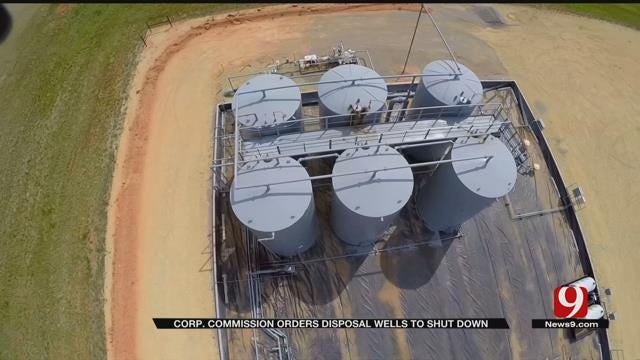Dozens of Wastewater Wells Directed To Shut Down In OK
<p>The Oklahoma Corporation Commission has directed dozens of wastewater disposal wells within an approximate 725-square-mile radius of the epicenter the Oklahoma earthquake to shut down. </p>Saturday, September 3rd 2016, 2:04 pm
The Oklahoma Corporation Commission has directed dozens of wastewater disposal wells within an approximate 725-square-mile radius of the epicenter the Oklahoma earthquake to shut down.
The commission said about 37 wells are included in the directive, which was issued following the 5.6-magnitude earthquake that struck Saturday morning about nine miles northwest of Pawnee in north, central Oklahoma.
This directive includes 211 square miles of Osage County which is outside of the corporation's oil and gas division. The Environmental Protection Agency, which has sole jurisdiction over disposal wells in Osage County, will determine what action to take in that area.
9/3/16 Related Story: 5.6 Magnitude Earthquake Rocks Oklahoma
The number of magnitude 3.0 or greater earthquakes has skyrocketed in Oklahoma, from a few dozen in 2012 to more than 900 last year.
Commission spokesman Matt Skinner said the wells were directed to shut down due to scientific links that the increase to the underground disposal of wastewater from oil and gas production induces earthquakes. The commission has previously asked producers to reduce wastewater disposal volumes.
The earthquake ties the record for the strongest earthquake in recorded Oklahoma history. No major damage was reported, and there was one minor injury.
The 37 wells will be shut down within 10 days and will vary. The corporation said the schedule is necessary because seismologists said a large scale, sudden shutdown could cause an earthquake.
This is actually the largest number of wells the OCC has ever ordered to shut down at one time, and the order is indefinite. This is also the first emergency action taken since the commission was given that authority this year.
Scientists and politicians were quick to reach the scene in Pawnee.
U.S. Sen. James Lankford applauded the local response, but did not make a connection between the wells there and the earthquakes.
“We’re in an historic fault line,” Lankford said while visiting the town. “We know that in Oklahoma, but it’s also not been active in a long time, so they’re trying to determine is this a cycle? Are some of these related to the injection wells and some of them are not? Are all of them related? No one has any idea.”
OSU geology professor Todd Halihan said there is a known connection.
“Even as you turn down the wells, you still can have earthquakes occur if they were induced,” Halihan said.
He and other seismologists are installing new equipment to study the aftershocks they say are still to come.
However, that tens of millions of dollars are needed to go underground to research the real link between injection wells and seismic activity, Halihan said.
“It probably would have to be something like a federal response, but there has to be some investment in what’s happening in the sub-surface, not just watching what went in and what came out,” he said.
Halihan said academics like himself are excited by the prospects of learning new information from Saturday's earthquakes. Unlike the Prague earthquake in 2011, geological surveyors already had equipment in place in Pawnee.
Halihan said he is concerned about where the next event might hit, as Pawnee was also more populated than Prague.
Attached is the letter to operators sent by OCC:
More Like This
September 3rd, 2016
November 13th, 2024
October 28th, 2024
October 17th, 2024
Top Headlines
March 2nd, 2025
March 2nd, 2025
March 2nd, 2025











